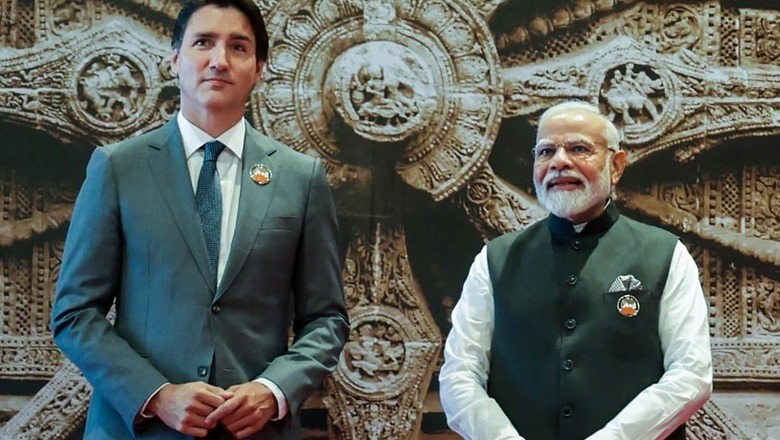
views
Canadian Prime Minister Justin Trudeau finally got a meeting with Prime Minister Narendra Modi in the final hours of the G20 Summit in New Delhi. While the Canadian leader failed to clinch a bilateral sit-down with India, a brief last-minute pull-aside with PM Modi was the best outcome he could have hoped for as ties between India and Canada remain in a slump.
It did not end well though. Instead of a breakthrough, a rekindling of ties, or even a slight ray of hope— not only did the Canadian Prime Minister receive a stinging rebuke from India over Khalistani extremism, but Trudeau remained defiant and frankly, unhinged. In a press conference after the meeting, armed with ‘climate’ and ‘gender’, completely out-of-touch buzzwords in the context of Indo-Canadian ties, Trudeau played down the brutal castigation that he received at the hands of the Indian leadership.
In a statement that seemed to put Indo-Canadian ties in the league of rock-bottom relations with Pakistan, India raised the “continuing anti-India activities of extremist elements in Canada”.
“They are promoting secessionism and inciting violence against Indian diplomats, damaging diplomatic premises and threatening the Indian community in Canada and their places of worship,” the statement went on.
Finally, India called for mutual respect and trust in Indo-Canadian relations — a bare minimum ask reflecting just how severely ties have been afflicted by Trudeau’s mollycoddling of Khalistani extremists under the garb of freedom of speech. To further add to his woes, just as the Canadian leader was ready to fly out of India, his airplane hit a technical snag leaving him stuck in New Delhi for another night.
These few hours may have hopefully served as a moment for Justin Trudeau to reflect. This was his first visit to India since the “disastrous” trip in February 2018, where he was snubbed royally by the Indian government for his links with Khalistani extremists. All he had to do this time around was prevent another such disaster. After all, he had five years to prepare! But he was anything but prepared. In fact, he made some last-minute efforts not to ease tensions with India, but to seek leverage — only he grossly misread his fate as he did not have the luxury to pull off any power moves.
Ahead of his visit, Trudeau spoke to Ukrainian President Zelensky, expressing his disappointment that Ukraine was not invited to the G20 summit by the host nation, India. The Canadian government has also abruptly put fast-moving trade talks with India on hold, with no reason supplied whatsoever. He further hinted that he would be bringing up “foreign interference” with India’s leadership essentially reiterating the Canadian intelligence community’s claim that India, apart from Russia, China and Iran interferes in Canada’s internal affairs. The stage was set for another diplomatic catastrophe for Trudeau who seems to have vowed to engage in self-sabotage when it comes to international diplomacy.
At the G20 Summit, the Canadian Prime Minister’s performance at this high-stakes diplomatic forum was lacklustre. His body language exuded discomfort, especially when interacting with PM Modi. He did not have major bilateral meetings with any leader during the summit.
Suffice it to say that Justin Trudeau had a tough time in New Delhi. It is not just India that snubbed the Canadian leader, but also most other powers of the G20. To add to the injury, he remained missing in all the major announcements, far away from the limelight.
One of the greatest highlights of the first day of the two-day G20 Summit in New Delhi was the announcement of an India-Middle East-Europe transport corridor, by PM Modi, US President Joe Biden, Saudi Crown Prince Mohammed bin Salman, German Chancellor Olaf Scholz and European Commission leader Ursula von Der Leyen. Missing on stage was the Canadian Prime Minister, confirming that Canada had not only missed the bus, but it was not even missed by those on the bus.
The picture was similar when BRICS leaders minus China’s Xi Jinping and Russia’s Vladimir Putin got together for a photo-op with Biden and World Bank CEO Ajay Banga. Canada, firmly under the USA’s umbrella, failed to make the cut here as well. This comes against the backdrop of Biden pushing to secure support for expanding the World Bank’s lending capacity as geo-economic competition with China grows. Canada’s ties with China remain strained, but it fails to secure a seat at the table with its allies to combat Beijing’s global influence.
There used to be a time when Canada and the US stood together in international diplomacy. It was clear, however, that Canada was an insignificant player on the global stage when it was not invited by its allies to join the AUKUS— a trilateral security pact between Australia, the United Kingdom and the United States. More significantly, India seems to stick to the tradition of royally snubbing Justin Trudeau for the Canadian leaders’ link with Khalistani extremists.
Trudeau’s tryst with climate action also remained dull as the Canadian Prime Minister was missing from the photo-op on the launch of the Bio-Fuels Alliance founded by India, the US and Brazil.
Trudeau’s absence from all of the main highlights of the G20 summit shows just how poorly he has been managing Canada’s diplomatic affairs. At a time when his opponent Pierre Poilievre’s political assault intensifies, Trudeau is making appearances just for the sake of it, lackadaisically catering to his audience back home. As far as foreign policy goes, the incumbent Canadian Prime Minister has thrown in the towel.



















Comments
0 comment